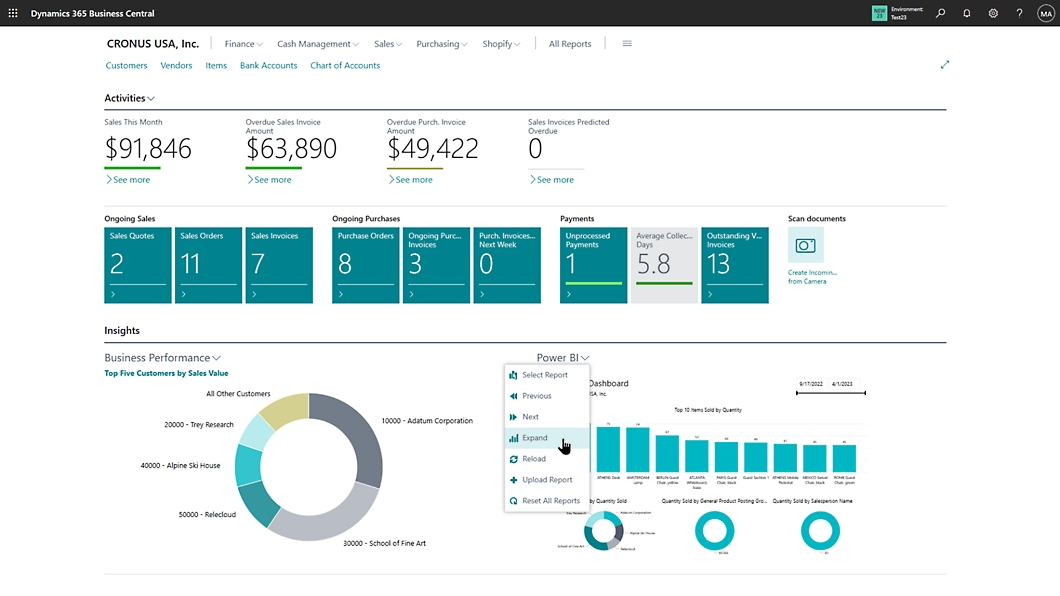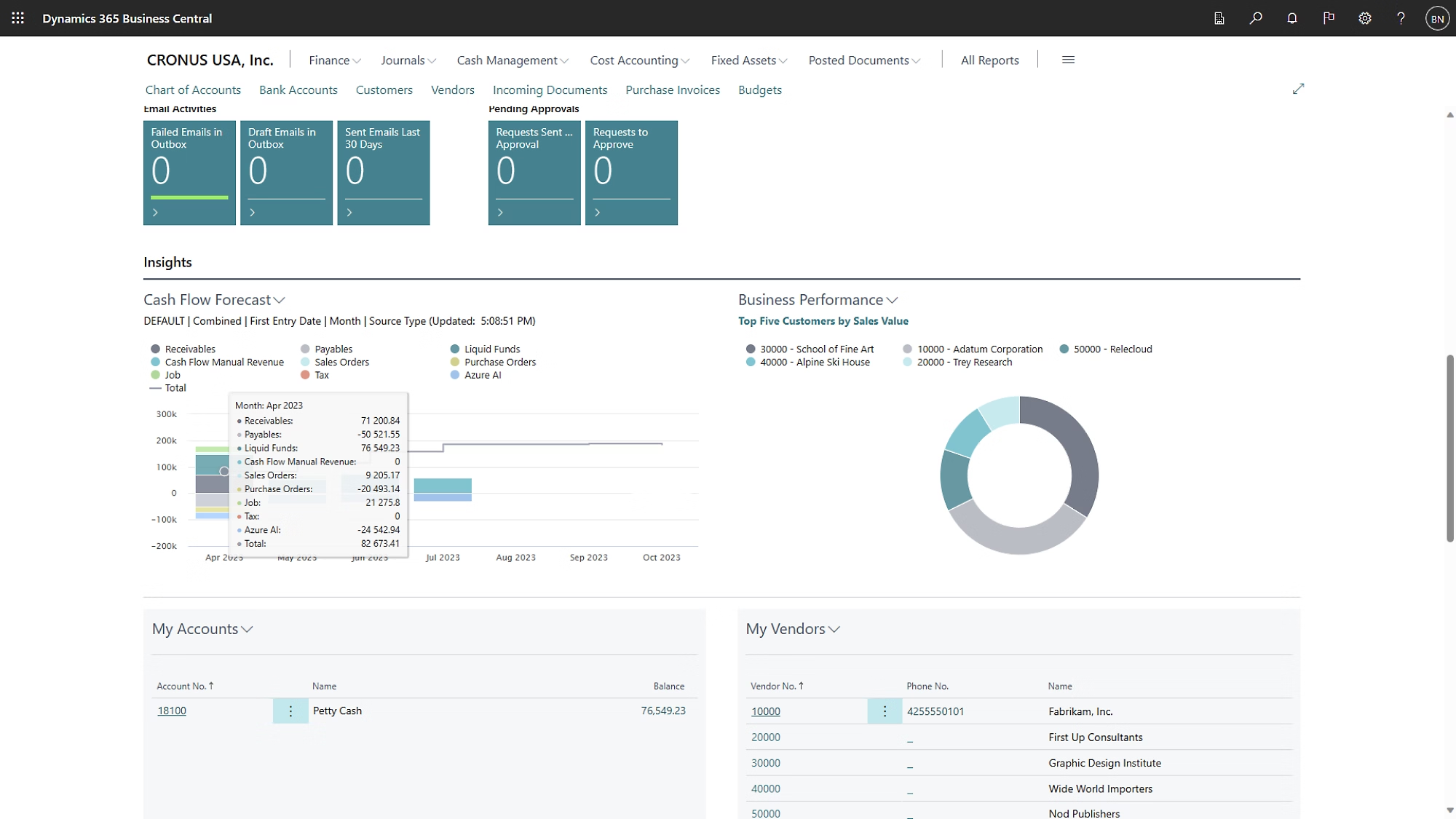/ Technologies

/
article
/
Imagine having everything you need to manage your business — from finance to warehouse management to sales and marketing — all at your fingertips in one easy-to-use system. Enterprise Resource Planning (ERP) system helps companies achieve greater efficiency, better results and more satisfied customers.
In this article, we will look at how ERP really works, what it can bring you, and how a specific solution such as Microsoft Dynamics 365 Business Central, useful just for you.

ERP connects everything needed for the day-to-day running of a business and integrates everything into a single system. No more skipping between tables, apps, and notes. ERP brings you one source of truthwhere everything is in its place.
This way you don't have to guess how many products you have in stock, whether the invoice is paid, or how the sales team is doing. You can see everything clearly, in real time and whenever you need it.
Every entrepreneur knows this: papers on the table, spreadsheets that don't always make sense, and information that teams only half pass between themselves. The Enterprise Resource Planning system will clean all this up. All data about your business is in one place, be it warehouse, finance, sales or marketing. That means less confusion and more certainty that things are happening the way they are supposed to.
How many times have you wished routine tasks would solve themselves? Invoices that are automatically sent when an order is completed, reminders for the team to meet the deadline, or reports that are generated without your intervention. Enterprise Resource Planning systems such as Business CentralHe can do all this. And what does that mean for you? You can devote yourself to what is really important and not deal with trifles.
Do you ever feel like you're making decisions based on intuition alone? With the Enterprise Resource Planning system, this will change. You have data to show you what works in your business and what needs to be improved. For example, you can see which product sells best, where you lose money, or which customer is most valuable to you.
Business Central is Microsoft's modern Enterprise Resource Planning system designed to grow with you. It is ideal for small and medium-sized businesses that need to have everything under control while looking for flexibility. Works in the cloud, so you can access it from anywherewhether you are in the office, at home or on the go.

Imagine a small company that makes furniture. Thanks to the ERP system, it can connect production, warehouses and sales. If they get a big order, Business Central will show them what materials they have in stock, what needs to be ordered and how to schedule production so that they deliver everything on time.
If you start an e-shop, you face all sorts of challenges. Suddenly you find that there is an increase in demand that you have in stock in very small quantities, or vice versa — you have stocked up on goods that you are not interested in. Implementing Business Central gives you allows you to track inventories in real time and automate orders from suppliers. The result will not only be fewer complaints, but also an increase in turnover.
Imagine a small IT firm managing infrastructure for its clients. Each client has different needs, contract terms and maintenance schedule. With an Enterprise Resource Planning system like Business Central, workers can easily track which services have already been provided, what needs to be scheduled, and when the billing deadline is approaching. Automated reminders and clear planning allow the firm to effectively manage clients and ensure that no contract falls through the cracks.
Imagine a medium-sized construction company struggling to manage several projects at the same time. Each project has its own budget, schedule and team. The Enterprise Resource Planning system links all this information into one place, allowing the company's management to monitor how individual projects are developing. Managers see if budgets are being met, which materials need to be ordered and where they can optimize costs. Thanks to this, the company is able to effectively manage its resources and meet deadlines.
Modern ERP systems are increasingly integrating AI that can, for example, predict demand, design optimal inventory, or automate customer support.
With the growing trend of remote working, it is crucial that ERP systems are available on mobile devices. This ensures flexibility and increases the productivity of teams.
Businesses are looking for ERP systems that they can adjust exactly to their needs. Business Central enables integration with other tools and offers flexibility for different lines of business.
Every business is different, which is why it is important to choose an Enterprise Resource Planning system that fits your specific needs. Business Central is a great choice for small and medium-sized businesses due to its flexibility and user-friendliness.
The success of the implementation depends on your people and their training. Make sure your team understands how ERP works and that they see its benefits. Training is key.
You don't have to implement all the features at once. Start with key processes and gradually add more modules as your team gets comfortable with ERP. That's why it's a good idea to look for a scalable solution that will grow with you.
Enterprise Resource Planning System Microsoft Dynamics 365 Business Central helps you to be more efficient and organized in your business. Whether you're dealing with inventory, finance, or customer service issues, Enterprise Resource Planning can help you achieve better results. Start step by step and you will soon see how much change it can bring.
Want to know more? Contact specialists Blue Dynamic.
Enterprise Resource Planning: How ERP Will Change Your Business for the Better
/ Whether you know exactly what you need or just want to explore opportunities and possibilities.

Czech Republic
Prazska 239, 250 66 Praha - Zdiby
Česko
Blue Dynamic, s.r.o.
IČO: 02339234
DIČ: CZ02339234

Netherlands
Lange Viestraat 2 B, 3511 BK Utrecht
Holandsko
Blue Dynamic, B.V.
KVK: 30137532
VAT: NL805557532B01